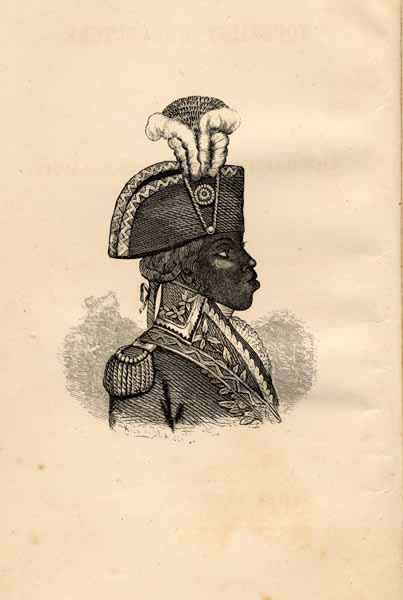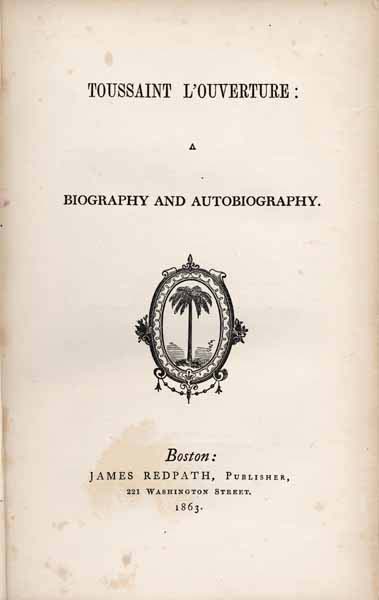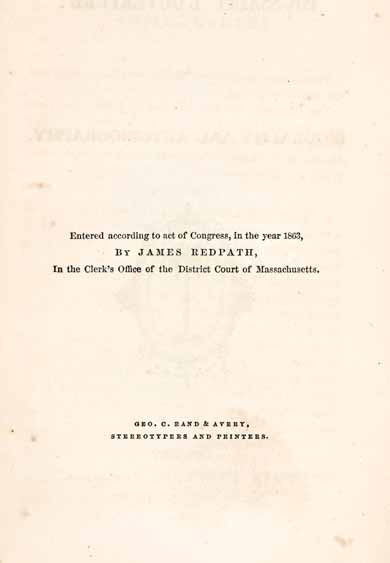TOUSSAINT L'OUVERTURE:
A
BIOGRAPHY AND AUTOBIOGRAPHY.
Boston:
JAMES REDPATH, PUBLISHER,
221 WASHINGTON STREET.
1863.
Entered according to act of Congress, in the year 1863,
BY JAMES REDPATH,
In the Clerk's Office of the District Court of Massachusetts.
GEO. C. RAND & AVERY,
STEREOTYPERS AND PRINTERS.
INTRODUCTION.
THIS volume contains two distinct works,--a Biography and an Autobiography.
The Biography was first published in London, ten years since, as "The Life of Toussaint L'Ouverture, the Negro Patriot of Hayti: By the Rev. John R. Beard, D. D., Member of the Historico-Theological Society of Leipsic, etc." It had the following--
PREFACE.
"The life which is described in the following pages has both a permanent interest and a permanent value. But the efforts which are now made to effect the abolition of slavery in the United States of America, seem to render the present moment specially fit for the appearance of a memoir of TOUSSAINT L'OUVERTURE. A hope of affording some aid to the sacred cause of freedom, specially as involved in the extinction of slavery, and in the removal of the prejudices on which servitude mainly depends, has induced the author to prepare the present work for the press. If apology for such a publication was required, it might be found in the fact that no detailed life of TOUSSAINT L'OUVERTURE is accessible to the English reader, for the only memoir of him which exists in our language has long been out of print.
"The sources of information on this subject are found chiefly in the French language. To several of these the author acknowledges deep obligation.
"The tone taken on the subject of negro freedom in Hayti, by recent writers in two French reviews, is partial and unjust.
Possibly this may be attributable to a mulatto pen. The blacks have no authors; their cause, consequently, has not yet been pleaded. In the authorities we possess on the subject, either French or mulatto interests, for the most part, predominate. Specially predominant are mulatto interests and prejudices, in the recently published
Life of Toussaint L'Ouverture, by SAINT REMY, a mulatto: this writer obviously values his caste more than his country or his kind."
With this work the editor has taken the liberty of making a few verbal and other changes in the text of the opening chapters; of erasing the two elaborated guesses as to Toussaint's Scriptural studies and readings in the Abbé Raynal's philosophy; and of omitting the entire Book IV., which gave a sketch of the history of Hayti from the death of Toussaint to the reign of the late Emperor Soulouque. The alterations in the first chapters referred chiefly to statements respecting modern Hayti, with which the editor's travels and his official relations to its Government had made him more familiar than the author. Book IV. was erased because it was deemed an inadequate presentation of the history of an independent negro nationality,--not unfair, indeed, nor essentially inaccurate, but too meagre for publication in the United States where its statements would necessarily be weighed in the scales of party. It is hoped that a full and impartial history of Hayti will, erelong, be presented to the American people; until then, the sketches in the encyclopedias and the summary of Mr. Elie in "The Guide," must suffice to indicate the governmental changes that have occurred in the island.
*
* The few references in the Notes to this book (we may say in passing) will lose every appearance of bad taste or of egotism, when it is stated that it is simply an unpretending collection of facts, to which no claim or pride of authorship can justly attach.
In the historical record of Dr. Beard, no changes have been made. This fact does not imply a uniform concurrence of judgment. For it is but justice to say, that, although "the blacks have no authors," they have found in Dr. Beard not a friend only, but an able and zealous partisan.
There have been three versions of Haytian history,--the white, the black, and the yellow: the white representing the pro-slavery party, the black that of the negroes, and the yellow that of the mulattoes. The abolitionists of England and America have adopted the negro standard,--refusing equally to pay any homage to Pétion, the idol of the mulatto historians, whom they call the Washington of Hayti, or to regard Toussaint as the
bête noir of the revolution, or otherwise than as Hayti's hero,
"Great, ill-requited chief."
This brief statement will show that to have undertaken to present the other sides of the events narrated would have required a volume of notes.
The "Notes and Illustrations" of Dr. Beard, with one exception, have, also, been omitted, and others deemed more interesting and pertinent substituted for them.
It is from the "Mémoires de la Vie de Toussaint L'Ouverture," edited by the M. Saint Remy, whose partisan spirit Dr. Beard reproves, that the Autobiography of the great General and Statesman is taken.
"The existence of these Memoirs," he says, "was first mentioned by the venerable Abbé Grégoire, bishop of Blois, in his curious and entertaining work entitled, 'The Literature of the Negroes.' In 1845, the journal 'La Presse' published fragments of them; and at that time some persons seemed to doubt their authenticity. But, quite recently, through the friendly medium of Mr. Fleutclot, member of
the University of France, I was enabled to obtain from General Desfourneaux a copy of these Memoirs which he had in his possession. Still later, after much research, I succeeded in discovering the original manuscript in the General Archives of France. Eagerly, and with scrupulous attention, did I peruse the lengthy pages, all written in the hand of the First of the Blacks. The emotions excited in me by this examination will be better understood than they can be described. The mind is thrown into an abyss of reflections by the memory of so lofty a renown bent under the weight of so much misfortune."
M. Saint Remy adds, that "Toussaint's cast of mind may well be judged from the fact that his own manuscript is entirely at first hand, without an erasure or an insertion."
This interesting paper is now first published in the English language, having been expressly translated for this volume.
"Are the Negroes fit for Soldiers?" Ignorant of the history of Hayti, which forever settled the question, our journalists and public men for many long months disputed it, until the gallant charges on Port Hudson and Fort Wagner put an end to the humiliating debate.
"Are Negroes fit for Officers?" We are entering on that debate now. The Life of Toussaint may help to end it. What Toussaint, Christophe, Dessalines did,--"plantation-hands" and yet able warriors and statesmen, all of them,--some Sambo, Wash, or Jeff, still toiling in the rice-fields or among the sugar-canes, or hoeing his cotton-row in the Southern States, may be meditating to-day and destined to begin tomorrow.
BOSTON, SEPTEMBER, 1863.


